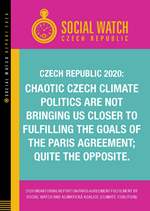Czech Republic 2020: Chaotic Czech climate politics are not bringing us closer to fulfilling the goals of the Paris Agreement
Published on Wed, 2020-09-30 00:00
Our current civilization could have emerged only thanks to suitable climatic conditions which arose with the end of the last ice age about 10 000 years ago. A stable and favourable climate enabled people to settle, build settlements, engage in agriculture, and develop technically and culturally. Approximately 200 years ago, the discovery that it was possible to obtain energy through burning fossil fuels led to an industrial revolution, to a further acceleration of technical progress, and to a huge increase in the world’s population as well. However, in discovering the effects of fossil fuel combustion on the chemical and physical composition of the atmosphere, this human evolutionary path has proven to be a dead end. As early as the 19th century, the role of carbon dioxide – a product of combustion – on the Earth’s greenhouse effect, which traps heat from the sun, was described along with the hypothesis that human activity could have an effect on the climate. By the middle of the 20th century, measurements had already shown that the concentration of carbon dioxide in the atmosphere was actually increasing due to the burning of fossil fuels and deforestation, and, in the 1980s, signs of global warming began to appear. The threat of catastrophic climate change subsequently resulted in efforts by the United Nations to promote climate protection as one of the key objectives of international cooperation. The year 1988 therefore saw the establishment of the Intergovernmental Panel on Climate Change (IPCC), in which scientists from around the world assess the development, impacts, and mitigation options of climate change. In 1992, the UN Framework Convention on Climate Change became the basis of international climate policy, whose parties, including Czech Republic, meet at an annual conference to assess progress in addressing this global threat. Following the dysfunctional Kyoto Protocol1, adopted in 1997 to set greenhouse gas emission limits on advanced industrialized countries exclusively, the Paris Agreement was adopted in 2015, requiring all countries, including developing nations, to set their own Nationally Determined Contributions (NDCs) – a necessary condition in achieving the main objective of the agreement. This is to keep ‘a global temperature rise this century well below 2 °C above pre-industrial levels and to pursue efforts to limit the temperature increase even further to 1.5 °C’.2 The signatories, including Czech Republic, agreed to the content of the Paris Agreement, ‘recognizing the need for an effective and progressive response to the urgent threat of climate change on the basis of the best available scientific knowledge’. Despite many years of efforts by some prominent political leaders to deny the anthropogenic cause of the changing climate, on 4 November 2017, Czech Republic joined the vast majority of countries in ratifying the Paris Agreement. The agreement has thus become binding to the country. In December 2019, Czech Republic even joined the European Union’s common goal of achieving climate neutrality as a whole by 2050, i.e., producing only as much greenhouse gas as we can capture from the atmosphere (either via natural processes or new technologies). In contrast to the contractual agreements, however, Czech climate policy is very incomprehensible (see the Social Watch 2020 national report). In particular, Prime Minister Babiš often claims something different at home than what he formally commits to at the European and international level. Perhaps he anticipates his voters’ concerns about changes related to consistent climate protection, ignoring the fact that the population is at least as afraid of climate change itself. At the same time, the Czech government is under the influence of the industrial, energy and agrarian lobbies, to whom a non-exploitative approach to the environment and a vision of long-term sustainability do not appear to be economically advantageous. That is also why it is failing to meet its obligations under the Paris Agreement in most key respects. As much as 43 % of the electricity in Czech Republic comes from lignite-fired power plants, and, in terms of emissions, the country is one of the five largest polluters in Europe and the ten largest in the world. A shift did not occur until the protests of the student movement Fridays for Future, to which the government responded by setting up the Coal Commission to decide upon a deadline for a coal phase-out in Czech Republic. The composition of the commission, the scenarios considered and all associated policies and government steps have not yet proved more considerable ambitions in Czech Republic’s efforts to prevent catastrophic warming in accordance with the Paris Agreement. The Paris Agreement also identifies three key areas in which changes are needed, with respect to making the reduction in greenhouse gas emissions and the overall transformation of our society not only effective but also sustainable and socially just. They mainly include the necessity of setting NDCs and ways of achieving them, but these must also be accompanied by the protection and further expansion of sinks, i.e., ecosystems capable of capturing and sequestering carbon. The transformation to climate neutrality must also be carried out in a socially sensitive and just way so that not all of the burden of the necessary change of our entire civilization is carried only by the most vulnerable groups – be it mining and energy workers or the inhabitants of the developing world – without sufficient resources to enable timely and effective mitigation and adaptation measures. All three areas and their fulfilment in Czech Republic are discussed in more detail in the report. Czech Republic 2020: Chaotic Czech climate politics are not bringing us closer to fulfilling the goals of the Paris Agreement; quite the opposite, (in English and in Czech) by Social Watch Czech Republic. Michaela Pixova – editor Source: Social Watch Czech Republic. |


